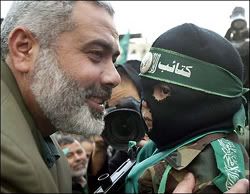Palestinian Prime Minister: "Hamas will not recognize Israel"
By Sarah el Deeb
October 6, 2006
 Hamas will not recognize Israel or give in to international pressure that has crippled the Palestinian government, Prime Minister Ismail Haniyeh told tens of thousands of banner-waving supporters at a rally Friday.
Hamas will not recognize Israel or give in to international pressure that has crippled the Palestinian government, Prime Minister Ismail Haniyeh told tens of thousands of banner-waving supporters at a rally Friday.
Haniyeh's fiery speech was interrupted when he fainted onstage, apparently overcome by the heat and two weeks of dawn-to-dusk fasting during the holy month of Ramadan. He resumed his speech after a few minutes.
"I tell you with all honesty, we will not recognize Israel, we will not recognize Israel, we will not recognize Israel," Haniyeh declared to a roar of applause from the crowd. "We say we will be in every government, we will stay in the government."
The Hamas leader ruled out a proposal by members of his own Hamas movement to form a new government of technocrats as a way of winning international support and ending a seven-month aid freeze.
"There are new scenarios, such as an emergency government, a technocrat government, or early elections," Haniyeh told the crowd in a packed soccer stadium. "They all aim at one thing, getting Hamas out of the government.
Moderate Palestinian President Mahmoud Abbas, who was elected separately, has the authority to dissolve the Hamas Cabinet and replace it with an emergency government, or could call early elections. However, Abbas aides say he's not considering either option at the moment, fearing such moves would not have popular support. An emergency government would also require approval of the parliament, which is controlled by Hamas.
Haniyeh said Hamas remains willing to invite other parties into a coalition, but that it would not soften its positions. In addition to recognizing Israel, the international community demands that Hamas renounce violence and accept existing peace agreements.
He accused the international community of trying to impose its will on the Palestinians. "They want a government with American and Israeli dimensions that implements external dictates, the so-called Quartet demands," he said, referring to the group of Mideast peacemakers - the U.S., the U.N., the European Union and Russia.
Haniyeh said his best offer to Israel was a temporary truce in return for establishment of a Palestinian state in the West Bank and Gaza Strip, with its capital in Jerusalem, over which Israel claims complete sovereignty. He also repeated demands for the release of thousands of Palestinians held in Israeli prisons
The 46-year-old leader's address had just got under way when, apparently weakened by fasting and the sweltering hot day, he began to slur his words, then slumped against aides surrounding him. He sat on a chair and resumed his address after a few minutes.
"Our bodies can get tired, but our soul will not, and we will not stop our steadfastness," he said of the incident.
The rally, with heavy security provided by armed Hamas militiamen, came at a time of increasing tension between the Islamic group and Abbas' Fatah Party.
The dispute between the two groups erupted into gunbattles last week, fueling concerns it could escalate into a full-fledged civil war.
Haniyeh called for Abbas to come to Gaza from his West Bank headquarters for talks to defuse the crisis. "Come here to Gaza to resume dialogue to protect the unity of our people," he said.
Hamas won a parliamentary election in January, bringing the party into direct confrontation with Abbas, who controls some of the security forces and backs peace talks with Israel.
In the West Bank on Friday, Israeli troops and Palestinians scuffled at a checkpoint south of Jerusalem when hundreds of Muslims tried to enter the Israeli-ruled city for Muslim prayers, witnesses said.
The Palestinians had arrived at the checkpoint, seeking to reach the Al Aqsa Mosque, Islam's third-holiest shrine. When some 300 people began pushing forward, paramilitary border police threw stun grenades to disperse the crowd.
A spokesman for the border police said nobody was injured in the incident.
During Ramadan, tens of thousands of Muslims attend prayers at the mosque. Citing security concerns, Israel bars Palestinian men under the age of 40 from reaching the site, in Jerusalem's walled Old City.
October 6, 2006
 Hamas will not recognize Israel or give in to international pressure that has crippled the Palestinian government, Prime Minister Ismail Haniyeh told tens of thousands of banner-waving supporters at a rally Friday.
Hamas will not recognize Israel or give in to international pressure that has crippled the Palestinian government, Prime Minister Ismail Haniyeh told tens of thousands of banner-waving supporters at a rally Friday.Haniyeh's fiery speech was interrupted when he fainted onstage, apparently overcome by the heat and two weeks of dawn-to-dusk fasting during the holy month of Ramadan. He resumed his speech after a few minutes.
"I tell you with all honesty, we will not recognize Israel, we will not recognize Israel, we will not recognize Israel," Haniyeh declared to a roar of applause from the crowd. "We say we will be in every government, we will stay in the government."
The Hamas leader ruled out a proposal by members of his own Hamas movement to form a new government of technocrats as a way of winning international support and ending a seven-month aid freeze.
"There are new scenarios, such as an emergency government, a technocrat government, or early elections," Haniyeh told the crowd in a packed soccer stadium. "They all aim at one thing, getting Hamas out of the government.
Moderate Palestinian President Mahmoud Abbas, who was elected separately, has the authority to dissolve the Hamas Cabinet and replace it with an emergency government, or could call early elections. However, Abbas aides say he's not considering either option at the moment, fearing such moves would not have popular support. An emergency government would also require approval of the parliament, which is controlled by Hamas.
Haniyeh said Hamas remains willing to invite other parties into a coalition, but that it would not soften its positions. In addition to recognizing Israel, the international community demands that Hamas renounce violence and accept existing peace agreements.
He accused the international community of trying to impose its will on the Palestinians. "They want a government with American and Israeli dimensions that implements external dictates, the so-called Quartet demands," he said, referring to the group of Mideast peacemakers - the U.S., the U.N., the European Union and Russia.
Haniyeh said his best offer to Israel was a temporary truce in return for establishment of a Palestinian state in the West Bank and Gaza Strip, with its capital in Jerusalem, over which Israel claims complete sovereignty. He also repeated demands for the release of thousands of Palestinians held in Israeli prisons
The 46-year-old leader's address had just got under way when, apparently weakened by fasting and the sweltering hot day, he began to slur his words, then slumped against aides surrounding him. He sat on a chair and resumed his address after a few minutes.
"Our bodies can get tired, but our soul will not, and we will not stop our steadfastness," he said of the incident.
The rally, with heavy security provided by armed Hamas militiamen, came at a time of increasing tension between the Islamic group and Abbas' Fatah Party.
The dispute between the two groups erupted into gunbattles last week, fueling concerns it could escalate into a full-fledged civil war.
Haniyeh called for Abbas to come to Gaza from his West Bank headquarters for talks to defuse the crisis. "Come here to Gaza to resume dialogue to protect the unity of our people," he said.
Hamas won a parliamentary election in January, bringing the party into direct confrontation with Abbas, who controls some of the security forces and backs peace talks with Israel.
In the West Bank on Friday, Israeli troops and Palestinians scuffled at a checkpoint south of Jerusalem when hundreds of Muslims tried to enter the Israeli-ruled city for Muslim prayers, witnesses said.
The Palestinians had arrived at the checkpoint, seeking to reach the Al Aqsa Mosque, Islam's third-holiest shrine. When some 300 people began pushing forward, paramilitary border police threw stun grenades to disperse the crowd.
A spokesman for the border police said nobody was injured in the incident.
During Ramadan, tens of thousands of Muslims attend prayers at the mosque. Citing security concerns, Israel bars Palestinian men under the age of 40 from reaching the site, in Jerusalem's walled Old City.




0 Comments:
Post a Comment
<< Home